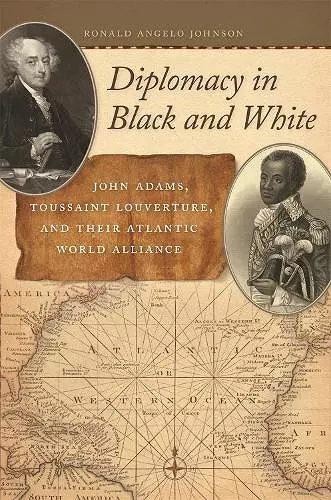Diplomacy in Black and White
John Adams, Toussaint Louverture, and Their Atlantic World Alliance
Format:Hardback
Publisher:University of Georgia Press
Published:15th Jan '14
Currently unavailable, our supplier has not provided us a restock date

The first history of the unlikely diplomatic alliance between the fledgling nations of the United States and Haiti
From 1798 to 1801, during the Haitian Revolution, President John Adams and Toussaint Louverture, forged diplomatic relations that empowered white Americans to embrace freedom and independence for people of color in Saint-Domingue, helping to bring forth a new nation: Haiti. This is the first book on the Adams-Louverture alliance.
From 1798 to 1801, during the Haitian Revolution, President John Adams and Toussaint Louverture forged diplomatic relations that empowered white Americans to embrace freedom and independence for people of color in Saint-Domingue. The United States supported the Dominguan revolutionaries with economic assistance and arms and munitions; the conflict was also the U.S. Navy’s first military action on behalf of a foreign ally. This cross-cultural cooperation was of immense and strategic importance as it helped to bring forth a new nation: Haiti.
Diplomacy in Black and White is the first book on the Adams-Louverture alliance. Historian and former diplomat Ronald Angelo Johnson details the aspirations of the Americans and Dominguans—two revolutionary peoples—and how they played significant roles in a hostile Atlantic world. Remarkably, leaders of both governments established multiracial relationships amid environments dominated by slavery and racial hierarchy. And though U.S.-Dominguan diplomacy did not end slavery in the United States, it altered Atlantic world discussions of slavery and race well into the twentieth century.
Diplomacy in Black and White reflects the capacity of leaders from disparate backgrounds to negotiate political and societal constraints to make lives better for the groups they represent. Adams and Louverture brought their peoples to the threshold of a lasting transracial relationship. And their shared history reveals the impact of decisions made by powerful people at pivotal moments. But in the end, a permanent alliance failed to emerge, and instead, the two republics born of revolution took divergent paths.
Ronald Angelo Johnson’s Diplomacy in Black and White offers a new, compelling, and highly readable account of an important episode in the early history of American foreign policy.
* author of Democracy’s Good Name: The Rise and Risks of the World’s Most Popular Form of Government *John Adams’s presidency and Saint Domingue’s revolutionary regime rarely get the attention they deserve in explaining the acquisition of Louisiana and shifts in the slavery debates in the United States. Ronald Angelo Johnson’s carefully argued and persuasive new book gives us an illuminating take on the equal partnership forged between the Adams administration and Toussaint Louverture—a fascinating and original study of diplomacy across the color line.
* author of Fallen Founder: The Life of Aaron Burr *With this incredible story of diplomacy and race during the Age of Revolution, Ronald Angelo Johnson deepens our understanding of the American paradox of race. We learn of a startling moment of realpolitik in Atlantic history when the white representatives of the proslavery republic collaborated with the black revolutionists who fought for the creation of Haiti. Gracefully written and thoroughly researched, Johnson's book shows how for twenty-one months in the final years of the eighteenth century, the making of Haiti depended upon cross-racial collaboration that ended only with the election of Thomas Jefferson.
* author of The Problem of Emancipation: The Caribbean Roots of the American Civil War *This intriguing analysis of trade and diplomacy between the United States during the presidency of John Adams and St. Domingue under Toussaint Louverture shows how pragmatism tinged with occasional idealism overcame racism while slavery still dominated much of the new North American nation. It is full of surprising details!
* author of Rice and Slaves: Ethnicity and the Slave Trade in Colonial South Carolina *[U]ntil Johnson, no one has thought fit to isolate for detailed study this remarkable story of transracial cooperation and overseas military intervention, a high-water mark of progressive American foreign policy that has not always been matched in the years since. A former State Department officer, Johnson brings to his considerable skills of historical narrative and interpretation an insider’s feel for the ambivalences of American diplomatic power.
* Journal of Southern History *Historians of the early American republic and of revolutionary Saint-Domingue will relish the minute description and analysis of the diplomatic moves between the two nations. Less specialized readers will likely enjoy the way in which Johnson adds little details based on no documentary evidence at all, which turns his very scholarly work into a breathtaking narrative.
* American Historical Review *Johnson has provided a fresh look at the Atlantic world that delivers more than it promises...Johnson has opened a new door on the study of inter-American diplomacy, which other historians should enter.
* Journal of American Ethnic HistoISBN: 9780820342122
Dimensions: unknown
Weight: unknown
264 pages